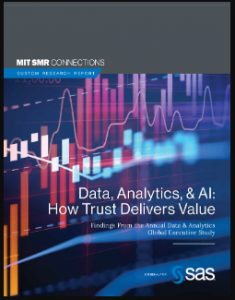While data analysis gets crucial place in business decision making process, less than a half of senior executive in companies feel confident they have right data to make such decisions, survey conducted by MIT SMR Connections and supported by SAS, the global leader in analytics, shows.

Focus of the survey “Data, Analytics, & AI: How trust delivers value” is on the degree of confidence that businesses have in the data they collect and analyse.
Extracting extra value from analytics and emerging technologies such as artificial intelligence starts with building confidence. Organizations that want to create a data-driven culture where people understand the data and use advanced analytics to make better decisions give priority to building trust in the data collected and stored, as well as the analytical insights they generate. This confidence building strengthens the data-driven culture they want. K
However, research shows that only 15 percent of the respondents who took part in the survey, use advanced analytics to make business decisions. Fewer than one in 10 works with automated analytics, and only 7 percent applying artificial intelligence and machine learning technologies to decision making.
A “Utility Gap”
Although 76 percent of respondents say they have increased access to data they find useful – a fact that is not surprising since the volume of data steadily increases as business digitization continues – only 43 percent feel they frequently have the right data to make decisions. This “Utility Gap”, as MIT SMR Connections characterizes, reveals a repeatability after having appeared similarly in its corresponding 2017 survey. This indicates a loophole of confidence, which is also reflected in another inquiry question. At around 10%, the responders say they always trust the data, while 40% (on average) say they trust them sometimes.
Three main conclusions
One of the most important findings of the survey is that there is a need for greater commitment and investment in managing and securing data, which is a cornerstone of confidence building. Particularly important are businesses dealing with security and data privacy protection, which are critical in maintaining customer confidence in the use of their personal data by companies.
Data security is in the strongest focus among survey respondents, and there is an opportunity to advance it by applying analytics and AI. There is also an opportunity to approach privacy initiatives and GDPR to build trust, rather than just conducting them as part of the compliance processes.
Finally, even though fostering analytics culture improves innovation, only minority of respondents are involved in activities that develop workforce data literacy. Finding the workforce with the right skills is one of the most significant challenges, so there is a lot of room for improvement and efforts to be put in bridging that ever-growing gap.
SAS’s mission is to inspire and improve business productivity through the creation and use of reliable data. For more than 40 years, its purpose was – and remains – to harness curiosity as the driving force behind progress and to encourage the creation of data-driven organizations through its plethora of advanced intelligence solutions and tools.
MIT SMR Connections conducted a global online survey on behalf of MIT Sloan Management Review, supported by SAS. The survey involved 2,413 respondents, with 70 percent identifying themselves as part of the management, c-level or board member.